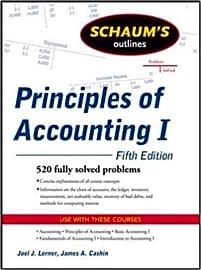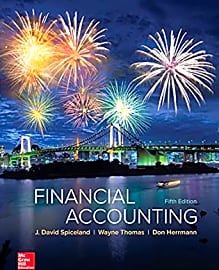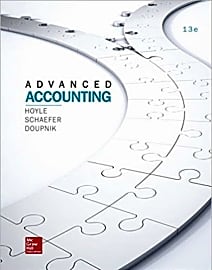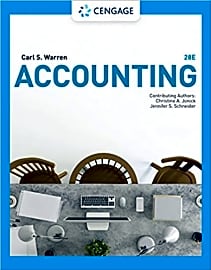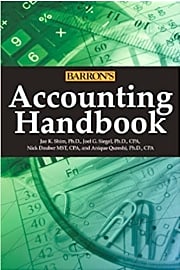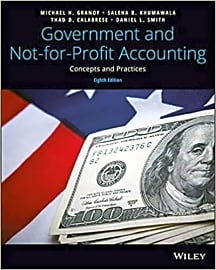The 10 Best Accounting Textbooks


This wiki has been updated 32 times since it was first published in May of 2017. From tax returns and corporate financial statements to liabilities and fraud, these accounting textbooks will help you get a solid foothold in the field. Whether you're aiming to become a CPA or would like to more fully understand your business' financial health, something from our selection will get you closer to your goal. We've included options for beginners as well as advanced learners. When users buy our independently chosen editorial recommendations, we may earn commissions to help fund the Wiki.
Editor's Notes
November 05, 2020:
Our first priority when updating this list was to make sure everything was as recent as possible, which meant bringing Accounting 28th Edition to its most current version and ensuring all other publishing dates were recent enough to avoid teaching obsolete information. While Advanced Accounting and Managerial Accounting each have a newer edition, these are international versions that are meant for students outside the US, so we chose to leave them as they are for now.
We also decided that although it's very helpful for business owners and laypeople, Accounting Made Simple is too short to consider a viable textbook for most students. We wanted to bring on something that catered to those looking to work for non-business entities, and so used the vacancy to add Government and Not-for-Profit Accounting to the line-up. While metrics like profit are relatively straightforward to measure, nonprofits and government agencies use different markers and require accountants to consider a dynamic range of aspects for their data. This text does a good job of showcasing that dynamism and arming students with the critical thinking skills needed to appreciate how to tackle it.
If you're not interested in pursuing accounting as a career and just want something to understand the discipline for your business, Fundamental Accounting Principles is a solid place to start. While you're filling your library with tomes to help you in your endeavor, you might want to check out our list of books for entrepreneurs as well.
July 03, 2019:
Our latest update required three texts to be supplanted by their newest editions. Fundamental Accounting Principles 24th Edition, Financial Accounting, and Intermediate Accounting 17th Edition have now been brought up to date.
We decided that our previous Financial Accounting 12th Edition, while a valuable selection, only catered to one specific style of learning and ran the risk of alienating students who dislike constant repetition or find that that approach makes it hard to focus. We took the opportunity to add Accounting Principles instead, which, thanks to its comprehensive nature, excellent layout, thoughtful pedagogy, and many self-guided practice opportunities, is a solid text for learners of all stripes.
We ensured this list had choices for beginning, intermediate, and advanced students, as well as the layman and sole proprietor. You'll also find a reference guide in Barron's Accounting Handbook and a primer with Accounting Made Simple, which can be beneficial to CEOs with little accounting experience and the industrious student alike. Those who need to work things out for themselves will appreciate Schaum's Outlines Principles of Accounting I, which provides plenty of knowledge-reaffirming practice exercises.
We chose books that come in multiple versions: e-text, loose leaf, hardback, and for rent. Students who require special access codes may have to purchase them separately through the publisher.
Special Honors
The American Institute of CPAs For career help, news, networking, and other resources, the American Institute of CPAs might be worth a look. They represent the CPA profession nationally regarding rule-making and standard-setting procedures, as well as develop standards for audits, provide educational guidance, develop and grade the Uniform CPA Examination, and more. There are several specific memberships available for just about every aspect of the field, from those focusing on not-for-profit companies to government-level auditing. aicpa.org
Becker CPA Review Those serious about taking and passing the CPA exam at some point might want to invest in a program offered by the likes the Becker. They have three levels of review courses, the most popular being their mid-tier Premium Package. This includes unlimited access to a four-part self-study review course, print and digital textbooks, flashcards, reviews, hundreds of multiple-choice questions, live online courses, success coaching, and more. becker.com
A Brief History Of Accounting
However, accountants got the last laugh, as any need for detailed financial information only creates the need for more accountants, causing the field to continue to grow.
For about as long as money's been around, there's been a need for accounting. The practice dates back to ancient Mesopotamia, around 5000 B.C.E., when people used it to track herd growth and crop yields, while the Babylonians and Egyptians developed auditing techniques around this same time.
By the time of the Roman Empire, accounting was seen as an essential practice for both the government and private businesses. The Romans were the first to force merchants to share financial information with them, thereby allowing them to ensure that everyone was rendering unto Caesar all of the things that were due unto Caesar.
The science would truly come into its own in the late 15th century C.E., when an Italian mathematician named Luca Pacioli published his seminal work on double-entry bookkeeping. The backbone of Pacioli's system is still in use today, which is why he's regarded as the father of modern accounting.
Professional accounting began as an offshoot of solicitation, as it was simply a service that solicitors would provide in addition to offering legal advice. It began to be so in-demand, however, that practitioners were able to offer their services full-time.
Once the Industrial Revolution was in full swing, however, financial transactions began to become more complex, thanks to the advent of corporations and an increase in global trade. The need for trustworthy bookkeepers skyrocketed, and standardized testing and licensing went into effect in 1896.
When the Securities and Exchange Commission was created in 1934, it brought accountants to the forefront of public consciousness, as they acted as corporate watchdogs. This eventually led to accountants offering other services, such as consulting — and it left unscrupulous firms open to conflicts of interest.
These issues would come to a head in 2001, when the Enron scandal brought down Arthur Andersen, which was then one of the top firms in the world. This caused Congress to pass the Sarbanes-Oxley Act, which restricted consulting practices and required more in-depth disclosures.
However, accountants got the last laugh, as any need for detailed financial information only creates the need for more accountants, causing the field to continue to grow.
Things To Consider When Pursuing A Career In Accounting
Pursuing an accounting degree can be a smart choice, as it's a reliable way to make a comfortable living. However, it's not for everyone, and there are a few things you should consider before signing up for those student loans.
The first is your personality type. If you find yourself drawn to rules and regulations (not to mention comforted by routine), then you could potentially excel in this field. However, if you're more concerned with expressing yourself than you are with following instructions, you might want to consider doing something else.
Pursuing an accounting degree can be a smart choice, as it's a reliable way to make a comfortable living.
Your ability to withstand a grind is also important. Accountants work long hours, and tax season can be a non-stop slog of overtime and weekend work. This can be extremely stressful, so if you're not adept at handling a strain, accounting can put you in an early grave.
Speaking of which, there are health considerations to keep in mind. You'll be chained to your desk for most of the day, which can be hazardous to your life expectancy. You'll also be tempted to grab fast food for every meal. If you're not able to hold yourself to a reasonable diet and exercise routine, you're probably better off choosing something less sedentary as a profession.
That's not to say that there aren't any positives associated with the profession. You can make very good money, and your job should be recession-proof. There are usually tons of opportunities as well, so it's easy to break into the profession when you're just starting out. Even with the rise of do-it-yourself software, jobs should be readily available.
Accounting is one of those jobs that people either love or hate, with little in-between. If you think you've got the disposition for it, it's a great way to have a stable long-term career.
How To Become An Accountant
If you've decided to pursue a profession in the high-paced world of accounting, you're fortunate in that there's a pretty clear career path that you can follow.
The first thing you need to do is get your bachelor's degree in accounting. In most jurisdictions, this is the absolute minimum amount of education you need to take the CPA exam.
Even if you haven't, though, you should be able to grab your ledger and show up to an entry-level job without much hassle.
Once you get that degree (and don't crunch the numbers on the financial intelligence of all those loans), it's time to choose a specialty. The two broad areas are public accounting and corporate or business accounting, each of which has a number of sub-specializations, such as auditing, managerial accounting, and so forth.
Next, decide if you want to become a CPA. It's not required, as you can get a job in a number of businesses without a certification, but you'll earn more as a CPA. The trade-off is that you have to put in a ton of work to pass that monstrous exam.
Once you get that license (or not), it's time for the fun part: landing a job. Ideally, you should have done an internship while you were in school, giving you an "in" at a large firm. Even if you haven't, though, you should be able to grab your ledger and show up to an entry-level job without much hassle.
From there, it's all about climbing the ladder. You might even consider getting your master's degree, or you could just put in the hard work impressing the higher-ups in your organization.


